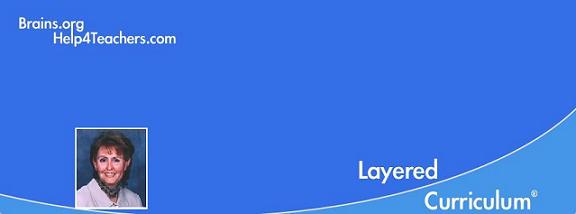__________Layered Curriculum®. . . because every child deserves a special education™_
 |
|
![]() _
_ ![]()
Layered
Curriculum TEXT & WORKBOOK
Set
for only
$43.95
(free shipping in
US)
Tweet
Children With Autism Need Accommodation for Reading MaterialBy Dr. Kathie F. Nunley
© 2016Recently I was speaking at a parent conference and a father of an 11-year old son with autism, posed a very common concern. While his son was a very capable reader, his comprehension and his speed varied significantly. "Sometimes my son loves to read and other times it seems a painful and slow experience for him.”
I pointed out that this probably varies based on whether you are asking a child with autism to read fiction or non-fiction. Fiction is nearly always about human relationships - a topic that people with autism rarely enjoy reading about.
Once the father thought about it, he agreed, “You’re right! He loves reading about space and astronomy, but when he had to read Swiss Family Robinson for school, it was painfully slow and he had zero comprehension or attention for it”
Children (and adults) with autism will rarely read, understand or relate to fictional literature. People with autism have a different human interaction experience, so these novels will be challenging. If you parent a child with autism, consider asking for a modification on their IEP that they be offered non-fiction books instead of fiction novels assigned in class. This will also be the case if watching videos or films that are relationship-based. Documentaries will be better understood.
Facts, black and white rules, firm routines and order help children with autism better function in a world that can be confusing at best and frightening at worst. Fiction novels and stories are based on the gray-areas of life and the ways in which humans relate to each other. Choose reading material that is fact-based and predictable. Just like all learning activities in the classroom, reading material should be predictable and routine when including children with autism. Encourage interaction with classmates, but do so in a highly structured format.
About the Author:
Dr Kathie Nunley is an educational psychologist, researcher and author of several books on parenting and teaching, including A Student's Brain (Brains.org) and the best selling, "Differentiating the High School Classroom" (Corwin Press). She is the developer of the Layered Curriculum® method of instruction and has worked with parents and educators around the world to better structure schools to make brain-friendly environments. In addition, her work has been used by the Boeing Corporation, Family Circle Magazine, the Washington Post, and ABC television.
Email her: Kathie (at) brains.orgCopyright © 1998 - current year by Kathie F. Nunley.
All Rights Reserved.
Layered
Curriculum is a registered trademark developed by
Dr. Kathie F. Nunley.